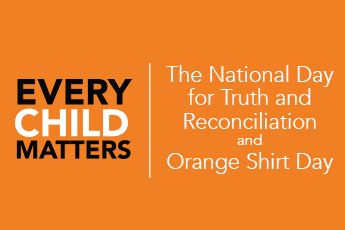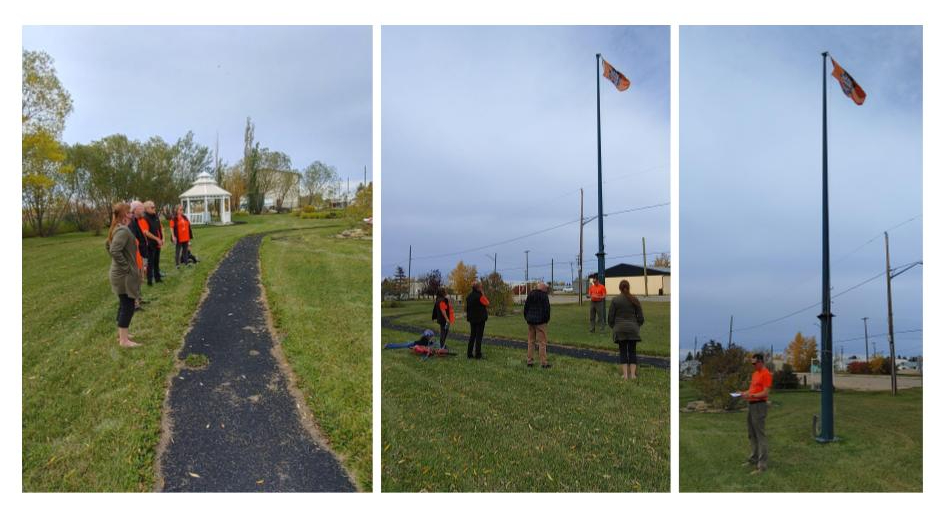
At 2:10pm on Thursday, September 30, 2021, the following words were shared by CAO Glen Hamilton-Brown to staff and residents in attendance as we gathered in to formally mark the National Day for Truth and Reconciliation.
Good afternoon everyone.
To begin today, we respectfully acknowledge that we are on Treaty 6 territory, a traditional meeting grounds, gathering place, and travelling route of the Cree, Saulteaux, Blackfoot, Métis, Dene and Nakota Sioux. We acknowledge all the many First Nations, Métis, and Inuit and many others whose histories, languages, and cultures continue to influence our community.
Today is September 30th and the Village of Ryley is joining countless other Canadian municipalities across the nation as together we mark the National Day for Truth andReconciliation. It is a day that invites us to pause and reflect on Canada’s relationship with Indigenous peoples because every Canadian has a role to play in the journey towards reconciliation. As we individually explore ways to increase our knowledge and understanding, the Village of Ryley’s administration is working on ways to continue its commitment to learning and doing our best to act in ways that are consistent with Truth and Reconciliation. To help facilitate this the flag you see here, bearing a now familiar image on orange, has been raised to remind us that Every Child Matters. There is also a list of links to a variety of resources for all ages on the Ryley website [below on this page] and have shared it on social media. We remind you that Truth and Reconciliation requires that we look at the hard and painful parts of our history as well as celebrating the unique heritage, diverse cultures, distinctive languages, and the spiritual beliefs of Indigenous peoples, as well as their exceptional contributions (past and present) that continue to enrich our community.
This summer the whole nation paused in sorrow upon hearing the tragic news of 215 unmarked and undocumented graves being identified at the former Kamloops Indian Residential School in B.C. Hundreds of unmarked graves have been identified at the sites of Indian residential schools across the country since, and more will continue to be
identified as the work to find and bring home missing children has just begun. These “discoveries” confirm what many Elders and survivors of the Residential school system have spoken of. Though being documented in the Truth and Reconciliation Commission of Canada’s Final Report, Volume 4, called Canada’s Residential Schools: Missing and
Unmarked Burials, this Truth has gone largely unrecognized by many Canadians until recent months. It is important that we recognize that the residential school system is not simply a tragic footnote in Canada’s past. There are approximately 80,000 survivors of these schools alive today. There is an estimated 20,000 Indigenous children who were taken from their families and placed in the child welfare system in what is now known as the Sixties Scoop, another government attempt at assimilation. The legacy of these institutions and actions continues to lay waste to individual lives and communities in their wake.
Starting in 2008 the Truth and Reconciliation Commission crisscrossed the country to interview more than 6,000 witnesses, including many survivors of residential schools who bore witness to the devastating impacts on them, on their communities, and on those who are left to heal from the intergenerational trauma that is the legacy of these
institutions. The TRC released its final report and the 94 Calls to Action in 2015. This report included a call for “the federal government, in collaboration with Aboriginal peoples, to establish as a statutory holiday a National Day for Truth and Reconciliation to honour survivors, their families, and communities, and ensure that public commemoration of the history and legacy of residential schools remains a vital component of the reconciliation process.” Earlier this summer, in response to this recommendation, the federal government passed legislation designating September 30 as the National Day for Truth and Reconciliation and a federal statutory holiday. The day is also known as Orange Shirt
Day, which began in Williams Lake B.C. in 2013 to honour Indigenous children sent to residential schools in Canada.
Justice Murray Sinclair, Chair of the TRC noted in the Final Report of the TRC, that “Reconciliation will not be easy and it will take time, but to make it happen, we must believe it should happen… All people in Canada, including newcomers, have a role in this relationship-building process. While we may not all share a past connected to the residential schools, we share a future. We must all call for an ongoing process of reconciliation, regardless of political affiliation, cultural background, or personal history.”
The Council of the Village of Ryley and its administration and staff have committed to continued learning and doing our best to act in ways that are consistent with Truth and Reconciliation. To that end, the administrative team has chosen to create this time on September 30th and to provide resources to reflect on and learn more about Canada’s past relationship with indigenous peoples and to honour and remember the victims of the residential school
system. Together let’s mark this day and that commitment with a 2’15” silence.
SILENCE
As we leave, I invite each one here to consider how we can walk the path to reconciliation, both as individuals and as a community.

Resources
As part of the Village of Ryley’s commitment to learning and doing our best to act in ways that are consistent with Truth and Reconciliation, we are providing a list of resources that will facilitate opportunities to access information for residents of all ages. We remind you that Truth and Reconciliation requires that we look at the hard and painful parts of our history as well as celebrating the unique heritage, diverse cultures, distinctive languages, and the spiritual beliefs of Indigenous peoples, as well as their exceptional contributions (past and present) that continue to enrich our community.
- Children’s Stories and Videos (Please review to ensure it is age appropriate)
Indigenous Read Alouds https://www.youtube.com/playlist?list=PLe939wSHN014tva5uGJhGoKgByqQDiZXv
Little Traverse Bay Bands Education Resources (mostly read along books) https://www.youtube.com/channel/UCBHZNFtOUAiZwn7p9kz7l5g/featured
- Documentaries and Learning Opportunities for Older Youth and Adults
Namwayut: we are all one. Truth and reconciliation in Canada https://www.youtube.com/watch?v=2zuRQmwaREY Canada’s Dark Secret https://www.youtube.com/watch?v=peLd_jtMdrc
Films and Documentaries on Residential Schools https://guides.library.ualberta.ca/residential-schools/films-and-documentaries
Truth and Reconciliation Website https://nctr.ca/about/history-of-the-trc/trc-website/
National Centre for Truth and Reconciliation Videos on Vimeo https://vimeo.com/user6187854/videos
- General Resources
Residential School Timeline https://dev.nctr.ca/exhibits/residential-school-timeline/
United Nations Declaration on the Rights of Indigenous Peoples https://dev.nctr.ca/education/teaching-resources/united-nations-declaration-on-the-rights-of-indigenous-peoples/
Free University of Alberta Course: Indigenous Canada https://www.ualberta.ca/admissions-programs/online-courses/indigenous-canada/index.html
GEM Resources on CBC https://gem.cbc.ca/collections/truth-and-reconciliation-collection
- Alberta Teacher’s Association List of Resources (Please review to ensure it is age appropriate)
Videos and Interactives: https://teachers-ab.libguides.com/c.php?g=709701&p=5056437
Photographs and Archives: https://teachers-ab.libguides.com/c.php?g=709701&p=5062269
Responses to the Truth and Reconciliation Commission: https://teachers-ab.libguides.com/c.php?g=709701&p=5056435
Sharing Stories of Residential Schools: https://teachers-ab.libguides.com/c.php?g=709701&p=5056434
Learning Opportunities for children, and youth of various ages:https://teachers-ab.libguides.com/c.php?g=709701&p=5056438 - Truth and Reconciliation Commission – Reports and Documents (including the 94 Calls to Action)
https://teachers-ab.libguides.com/c.php?g=709701&p=5056432